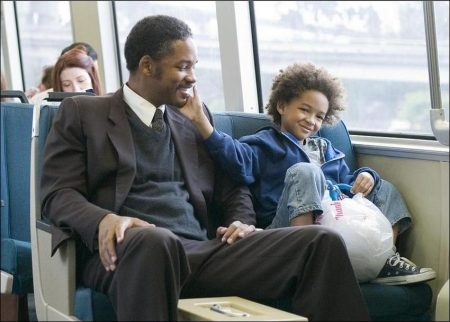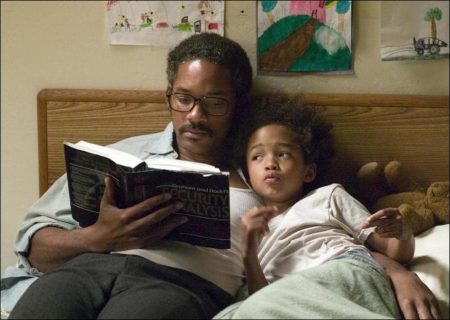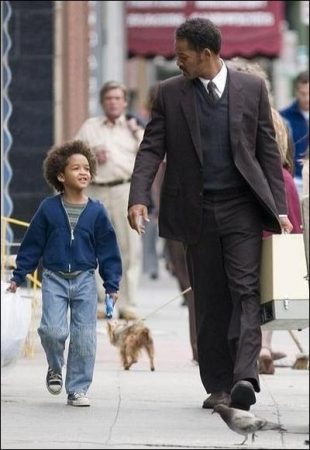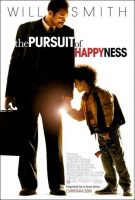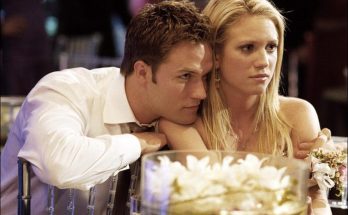Tagline: Inspired by a true story.
In the moving drama The Pursuit of Happyness, Chris Gardner (Will Smith) is a marginally employed salesman and a single father, struggling with the mother (Thandie Newton) of his five-year-old son (Jaden Smith). When they are evicted from their apartment, Gardner finds himself alone with his son in San Francisco and no place to go.
Even when Gardner lands an intern position at a prestigious stock brokerage firm, it pays no money. Forced to live in shelters, enduring many hardships as he goes through their program, Chris refuses to let this dampen his spirits as he pursues his dream of security for himself and his son.
“Don’t ever let somebody tell you you can’t do something. …You got a dream, you gotta protect it… If you want something, go get it. Period.”
In Columbia Pictures’ The Pursuit of Happyness, Chris Gardner (Will Smith) is a bright and talented but marginally employed salesman. Struggling to make ends meet, Gardner finds himself and his five-year-old son evicted from their San Francisco apartment with nowhere to go. When Gardner lands an internship at a prestigious stock brokerage firm, he and his son endure many hardships, including living in shelters, in pursuit of his dream of a better life for the two of them.
Chris Gardner (Will Smith) is a family man struggling to make ends meet. Despite his valiant attempts to help keep the family afloat, the mother (Thandie Newton) of his five-year-old son Christopher (Jaden Christopher Syre Smith) is buckling under the constant strain of financial pressure. No longer able to cope, she reluctantly decides to leave.
Chris, now a single father, continues doggedly to pursue a better-paying job using every sales skill he knows. He lands an internship at a prestigious stock brokerage firm, and although there is no salary, he accepts, hopeful he will end the program with a job and a promising future. Without a financial cushion, Chris and his son are soon evicted from their apartment and forced to sleep in shelters, bus stations, bathrooms, or wherever they can find refuge for the night.
Despite his troubles, Chris continues to honor his commitment as a loving and caring father, using the affection and trust his son has placed in him as an impetus to overcome the obstacles he faces.
In Pursuit of Chris Gardner
In 2003, executive producer Mark Clayman, a writer and actor who had been transitioning into producing, was one of many who saw a story about Chris Gardner on “20/20.” As he recalls, “My wife and I are not avid ‘20/20’ watchers, but we caught this segment, which discussed how Chris was faced with amazing obstacles, homelessness being at the forefront. There was a scene where he revisited a bathroom at a BART station with his son and he shared how he used to bathe him in the sink of the restroom.
Since we had a son who was a year old at that time, we both were moved to tears by it. I saw it not as a rags-to-riches story but as a moving father and son tale. I turned to my wife and said, ‘I’ve got to get the rights to this story.’”
Chris Gardner’s phone had been ringing off the hook the morning after the “20/20” segment aired, but Clayman commanded his attention, Gardner recalls, “because he was honest, direct, sincere, to the point.” A meeting was set up at the production company Escape Artists; the company’s three partners, Todd Black, Jason Blumenthal and Steve Tisch, had, in the past, individually been responsible for such films as Antwone Fisher, American History X, and the Oscar-winning Forrest Gump. ”The way I saw it,” says Blumenthal, “Chris Gardner’s story was universal. It was about how far a father would go to protect his son and to keep him safe. It contained an emotional nucleus that touched everyone and we used that as a stepping stone into a story inspired by Chris Gardner’s life.”
His partner, Todd Black, was also moved — and inspired. “I immediately said, ‘My God, this is a fantastic story. It’s like Rocky — a guy who is completely beaten down and goes on to succeed.’ It was definitely a movie, and we wanted to be the ones who made it.”
Black and Blumenthal contacted producer James Lassiter, Will Smith’s partner in Overbrook Entertainment. Lassiter was also impressed by the story: “I knew it would appeal to Will both as a man and as a father.” Lassiter sent the “20/20” tape to Vancouver, where Will Smith was shooting I, Robot, and less than 24 hours later, the actor responded.
“From the moment I saw the ‘20/20’ piece, I saw this story as the embodiment of the American dream,” says Will Smith. “The concept this country is based on is the hope that any person, armed with their own will and determination, can create their life, can create their situation — from the lowest of the low to the highest of the high. Any time you see someone who displays that kind of greatness and diligence, the natural question you ask yourself is — would I have been able to do that? Would I have been man enough, father enough, husband enough to stand up and face the adversity the way that person did — the way that Chris Gardner did? These were all questions I asked myself.”
Putting Happyness into Words
The next big step was turning a 15-minute television segment into a full-length feature film. “It’s always about finding the right writer,” admits Black. “Fortunately for us, we had just worked with Steven Conrad on The Weather Man. When we showed him the tape, he said, ‘I know how to make this into a movie. You’ve got to let me do it.’”
Despite giving his blessing to Escape Artists to develop a film inspired by his struggles, Gardner was initially wary of the license that needed to be taken to turn these events into a story for the screen, according to Blumenthal. “It was really important to us to meet him so we could reassure him that, no matter what changes we made for dramatic purposes, we would fight passionately to preserve the integrity of how he had lived, and continues to live, his life.”
After the initial meeting, the producers arranged for screenwriter Conrad and Gardner to meet in Chicago (where they both live). Gardner worked closely with the screenwriter, fielding many questions and serving as a sounding board. “Steve’s a Chicago kind of guy, which gave me a sense of comfort, since we had to spend a lot of time together. I told him my story and then he decided which elements could be used in the movie.Steve was very clear with me that he was a dramatist, not a biographer. I told myself from the very start, ‘Chris, you’ve signed away your life rights, so you’ve got to give Steve artistic license.’” (While the movie was being made, Gardner decided to write his own version of his story in the non-fiction The Pursuit of Happyness, which was released earlier this year to strong reviews).
Among the most prominent changes were turning the character of Gardner’s son from an infant into a five-year-old boy and the elimination of the small stipend Gardner received from his internship. The script also required the creation of characters who were composites of various people Gardner had encountered during that period of his life, including the mother of his young son.
“Chris was very honest with me about that period in his life,” says Conrad. “We both thought that the most important thing for the movie was to dramatize what it feels like to be broke. He was okay with some dramatic invention as long as I got the feelings right, especially what it’s like when you have no one to depend on but yourself.”
In addition, Conrad added some color by making the lead character a whiz at the Rubik’s cube (which was a fad in the early 1980s), though the real Gardner had never picked up a Rubik’s cube in his life. In the movie, the cube serves as a cue to help the audience understand the extraordinary skills that make Will Smith’s character stand out from the other candidates in the internship program.
The producers were very pleased with Conrad’s first draft. Black, who had known Conrad since the early 1990s and had gone on to produce his first screenplay, Wrestling Ernest Hemingway, observes, “Steve’s script was magical, like nothing I’d ever read before. He took the true-life happenings and combined them with some original dramatic material — and it all worked.”
Producer Lassiter was equally enthusiastic. “When I had watched the initial ‘20/20’ tape, I found it fantastic and inspirational, but I didn’t know how you could make a movie out of it. When I read the script, I was amazed. Steve absolutely captured the essence of what the story should be — and from that point on Will and I were in.”
The Pursuit of Happyness (2006)
Directed by: Gabriele Muccino
Starring: Will Smith, Thandie Newton, Jaden Smith, Zuhair Haddad, Dan Castellaneta, Takayo Fischer, Kevin West, George Cheung, David Michael Silverman, Scott Klace
Screenplay by: Steve Conrad
Production Design by: J. Michael Riva
Cinematography by: Phedon Papamichael
Film Editing by: Hughes Winborne
Costume Design by: Sharen Davis
Set Decoration by: Lauri Gaffin
Art Direction by: David F. Klassen
Music by: Andrea Guerra
MPAA Rating: PG-13 for language.
Distributed by: Columbia Pictures
Release Date: December 15, 2006
Views: 56
